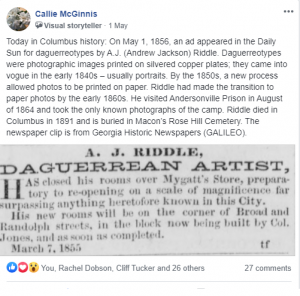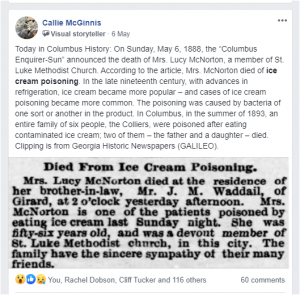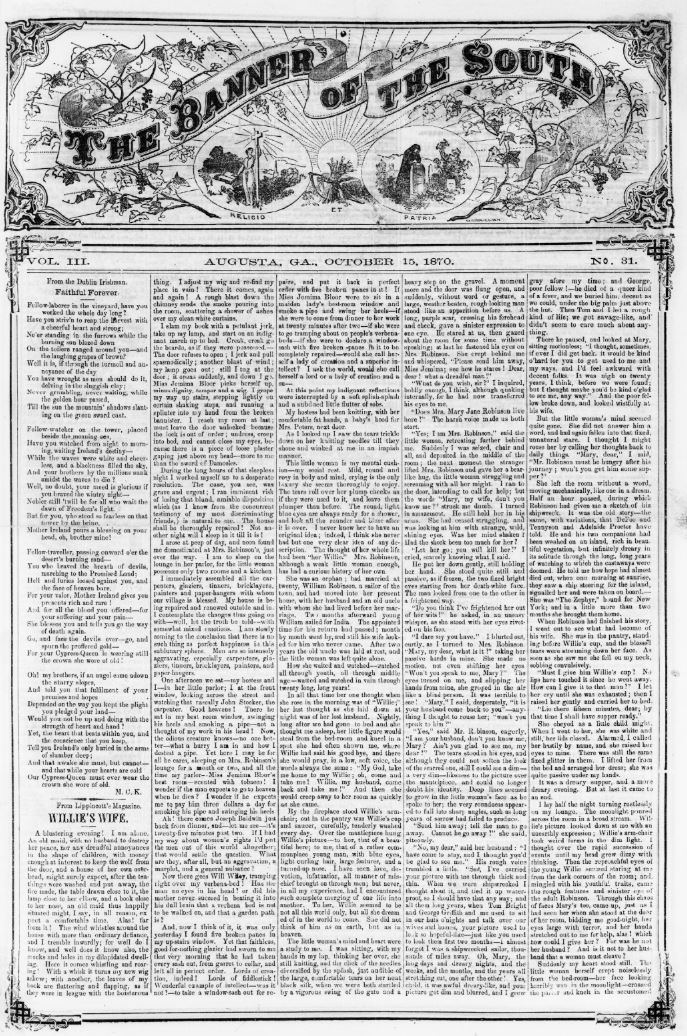Back at the end of April, during the early days of self-isolating (coronavirus pandemic), I was following a writer on a Facebook group called “Nostalgic Nawlins Memories.” Every day, this person, Derby Gisclair, posts a New Orleans-related photograph from the past – with a short commentary. As I was trying to think of something I could do to “help” during these trying times, I was inspired by Mr. Gisclair. I thought: I can write, I do genealogy, I love local history (Columbus, Georgia), and I like research (retired Columbus State University librarian). I got the idea to post something every day on the “Early Columbus Georgia” Facebook group I belong to. However, instead of using photographs, I realized I would use historic Columbus newspapers – available to all from the Georgia Historic Newspapers site. And that’s what I have done – starting on April 28, 2020, I began posting a “Today in Columbus History” piece on the Facebook group.

Every day I search the Georgia Historic Newspapers database for papers published on the date (month and day) I’m working with – no matter the year. I usually do a “Browse” search by “City” and randomly go through the titles; then I search the “Calendar” view. When I find an issue for the right date, I pull it up.
Usually, there are four pages. I have the best luck finding articles and ads on pages 3 and 4. Early nineteenth–century Columbus newspapers basically had 4 pages. Page 1 would usually include a lot of ads and national news. Page 2 would usually be comprised of politics and reported news from other places. Pages 3 and 4 would have more local stuff – as well as ads and legal notices.
I try to find a piece that I know a little bit about. I have to remind myself I am just writing a short blurb – I’m not writing a paper for publication. I try not to spend over an hour on each piece – although sometimes I do. Footnotes are not required (although I do try to cite my sources – particularly for the pictures I use). I also try to keep the commentary to one or two paragraphs. Sometimes I go over. And I usually include a couple of photos along with the newspaper clipping.
Subjects I have written about run the gamut: from sweet potato pudding recipes to the hiring of enslaved people to build a railroad, to picnics in the country, to the death of a little child. I have used ads for sewing machines, fine silver, guano, and sheet music. There is a lot to choose from!

So far, the response to these posts has been good. I get a lot of “likes.” The number of comments may vary from five or six to forty! There are many people in Columbus who have a much deeper and broader knowledge of Columbus history than I do. I love it when they add more to my short piece!
I don’t know how long I’ll keep this up. It is time-consuming, but, nerd that I am, I enjoy it (the tedious research part). Plus, what else do I have to do? Well, I could always be vacuuming or cleaning out closets or watching “Midsomer Murders” or talking on the phone or cooking up a fabulous dish or…
–Callie McGinnis
former Dean of Libraries (now retired)
Columbus State University


